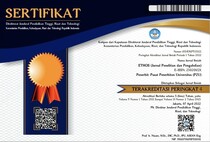Implementation of Waste Sorting Habits in the Buntet Islamic Boarding School Area
DOI:
https://doi.org/10.29313/ethos.v13i1.5292Keywords:
Buntet-Boarding School, Waste-sorting-habit-implementation, wasteAbstract
The Buntet Islamic Boarding School has been established since 1750. Currently, the Buntet Islamic Boarding School has expanded promptly in terms of both education and distribution of its location. This development has a multiplier effect on the expansion of other activities, namely the service and trade industry sectors. As a result, there has been a huge increase in waste production in the Islamic boarding school and adjacent areas. Many studies on waste management have been conducted, but trash disposal management is linked to community habits and culture, thus the purpose of this research is to describe the application of waste sorting behaviors in the Buntet Islamic Boarding School region. The approach method used is: by collecting data through surveys and field observations, then analyzing the estimated waste generation at the study location and then analyzing waste selection. The application of voting habits is an innovative finding to be incorporated into the educational curriculum of an Islamic boarding school, so that it can provide a waste solution.
References
Aji, R. R., Faniza, V., Tarlani, & Damayanti, V. (2021). Landslide Disaster Engineering in Tourism Potential Area. IOP Conference Series: Earth and Environmental Science, 830(1), 012036. https://doi.org/10.1088/1755-1315/830/1/012036
Albayrak, T., Caber, M., Moutinho, L., & Herstein, R. (2011). The Influence of Skepticism on Green Purchase Behavior Tahir Albayrak, PhD Assistant professor Akdeniz University School of Tourism and Hotel Management Campus Meltem Caber , PhD ( Corresponding author) Lecturer Akdeniz University Serik Vocational Schoo. Internatinal Journal of Business and Social Science, 2(13), 189–197.
Aulia, R. N., Narulita, S., Firdaus, M., & Mardhiah, I. (2018). Pengelolaan Lingkungan Berbasis Pesantren (Studi Kasus di Pondok Pesantren SPMAA Lamongan, Jawa Timur). Jurnal Pendidikan Lingkungan Dan Pembangunan Berkelanjutan, 19(1), 73–88.
Dedinec, A., Markovska, N., Ristovski, I., Velevski, G., Gjorgjievska, V. T., Grncarovska, T. O., & Zdraveva, P. (2015). Economic and environmental evaluation of climate change mitigation measures in the waste sector of developing countries. Journal of Cleaner Production, 88, 234–241. https://doi.org/10.1016/j.jclepro.2014.05.048
Fatimatuzzahroh, F., Abdoellah, O. S., & Sunardi. (2015). The Potential of Pesantren in Sustainable Rural Development. Jurnal Ilmiah Peuradeun, 3(2), 257–278.
Halvorsen, B. (2012). Effects of norms and policy incentives on household recycling: An international comparison. Resources, Conservation and Recycling, 67, 18–26. https://doi.org/10.1016/j.resconrec.2012.06.008
Haq, G., Cambridge, H., & Owen, A. (2013). A targeted social marketing approach for community pro-environmental behavioural change. Local Environment, 18(10), 1134–1152. https://doi.org/10.1080/13549839.2013.787974
Herawati, N., Sunyata, L., Lukitowati, S., & Magdalena Wuysang, J. (2024). Environmental Communication of the Kapuas River Clean Action by the Pontianak Young Generation. ETHOS: Jurnal Penelitian Dan Pengabdian Kepada Masyarakat, 12(2), 123–132. https://doi.org/10.29313/ethos.v12i2.3501
Khairani, N., & Fauzi, A. (2023). Program Eco-Pesantren: Peran dan Solusi dalam Pembangunan Berkelanjutan Terhadap Krisis Lingkungan. Jurnal Inovasi Penelitian, 4(2), 211–218.
Lickona, T. (2004). Character Matters: How to Help Our Children Develop Good Judgement, Integrity, and Other Essential Virtues. Simon and Schuster. https://books.google.co.id/ books/about/Character_Matters.html?hl=id&id=DydVrHfRf3IC&redir_esc=y
Loan, L. T. T., Nomura, H., Takahashi, Y., & Yabe, M. (2017). Psychological driving forces behind households’ behaviors toward municipal organic waste separation at source in Vietnam: a structural equation modeling approach. Journal of Material Cycles and Waste Management, 19(3), 1052–1060. https://doi.org/10.1007/s10163-017-0587-3
Matthies, E., Selge, S., & Klöckner, C. A. (2012). The role of parental behaviour for the development of behaviour specific environmental norms - The example of recycling and re-use behaviour. Journal of Environmental Psychology, 32(3), 277–284. https://doi.org/10.1016/j.jenvp.2012.04.003
McCarthy, B., & Liu, H. B. (2017). Food waste and the ‘green’ consumer. Australasian Marketing Journal, 25(2), 126–132. https://doi.org/10.1016/j.ausmj.2017.04.007
Nastain, M., Wulandari, M., Fariha, N. F., Bintara, C. S., Mutiara, M., Lestari, F. I., & Sari, N. M. P. (2024). Implementation of Digital Village by Creating Content for a Website as an Information Center in Banyumanik Village, Semanu, Gunung Kidul. ETHOS: Jurnal Penelitian Dan Pengabdian Kepada Masyarakat, 12(2), 115–122. https://doi.org/10.29313/ethos.v12i2.3508
Pakpour, A. H., Zeidi, I. M., Emamjomeh, M. M., Asefzadeh, S., & Pearson, H. (2014). Household waste behaviours among a community sample in Iran: An application of the theory of planned behaviour. Waste Management, 34(6), 980–986. https://doi.org/10.1016/j.wasman.2013.10.028
Schwartz, S. H. (1977). Normative influences on altruism. Advances in Experimental Social Psychology, 10(C), 221–279. https://doi.org/10.1016/S0065-2601(08)60358-5
Setiawan, B., Afiff, A. Z., & Heruwasto, I. (2020). Integrating the Theory of Planned Behavior With Norm Activation in a Pro-Environmental Context. Social Marketing Quarterly, 26(3), 244–258. https://doi.org/10.1177/1524500420949220
Stern, P. C., Dietz, T., & Kalof, L. (1993). Value Orientations, Gender, and Environmental Concern. Environment and Behavior, 25(5), 322–348. https://doi.org/10.1177/0013916593255002
Thøgersen, J. (1996). Recycling and morality: A critical review of the literature. Environment and Behavior, 28(4), 536–558. https://doi.org/10.1177/0013916596284006
Visschers, V. H. M., Wickli, N., & Siegrist, M. (2016). Sorting out food waste behaviour: A survey on the motivators and barriers of self-reported amounts of food waste in households. Journal of Environmental Psychology, 45, 66–78. https://doi.org/10.1016/j.jenvp.2015.11.007
Wall, R., Devine-Wright, P., & Mill, G. A. (2007). Comparing and combining theories to explain pro-environmental intentions: The case of commuting-mode choice. Environment and Behavior, 39(6), 731–753. https://doi.org/10.1177/0013916506294594
Wan, C., Shen, G. Q., & Choi, S. (2017). Experiential and instrumental attitudes: Interaction effect of attitude and subjective norm on recycling intention. Journal of Environmental Psychology, 50, 69–79. https://doi.org/10.1016/j.jenvp.2017.02.006
Wang, Y., Long, X., Li, L., Wang, Q., Ding, X., & Cai, S. (2021). Extending theory of planned behavior in household waste sorting in China: the moderating effect of knowledge, personal involvement, and moral responsibility. Environment, Development and Sustainability, 23(5), 7230–7250. https://doi.org/10.1007/s10668-020-00913-9
Zhang, B., Lai, K. hung, Wang, B., & Wang, Z. (2019). From intention to action: How do personal attitudes, facilities accessibility, and government stimulus matter for household waste sorting? Journal of Environmental Management, 233(December 2018), 447–458. https://doi.org/10.1016/j.jenvman.2018.12.059
Downloads
Published
How to Cite
Issue
Section
License
Copyright (c) 2024 Ivan Chofyan, Ina Helena Agustina, Dadan Mukhsin, Diden Rosenda, Muhtadin Yanto, Muhammad Alvianto Kartaatmaja

This work is licensed under a Creative Commons Attribution-NonCommercial-ShareAlike 4.0 International License.


















